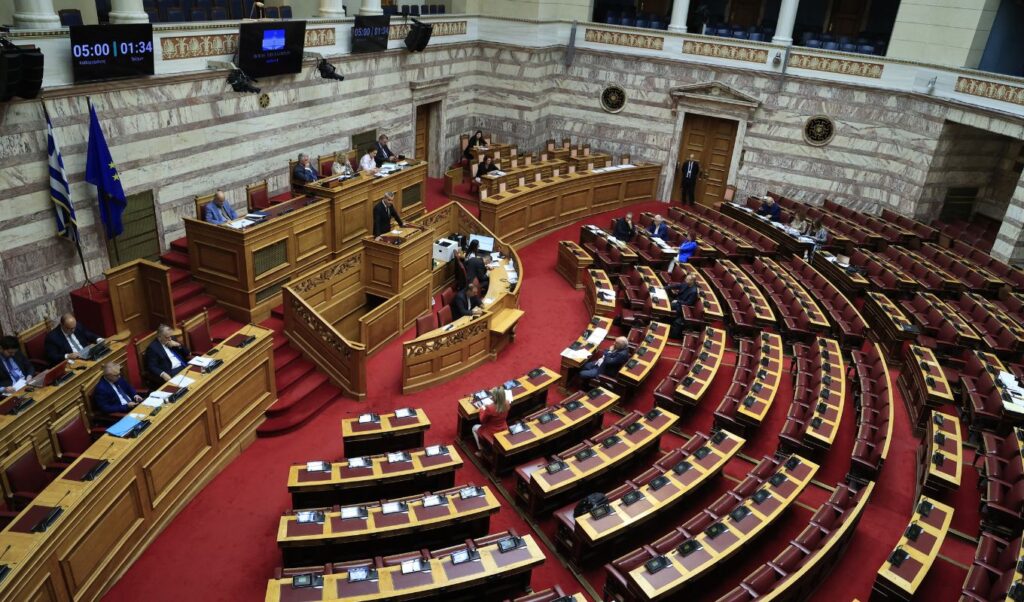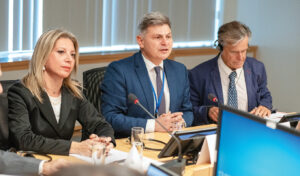The immigration bill enters public consultation today, reflecting the new government doctrine being implemented in light of the escalating situation and mass influx of migrants into the country, primarily from Libya. This bill comes in the wake of the asylum amendment that signals the adoption of a hard line by the government. The bill proposed by Thanos Pleuris is the one prepared by Makis Voridis, which the current minister had announced would be enacted into law during the handover ceremony. As he characteristically stated: “I had the opportunity in Parliament to see the presentation of the basic principles of the bill that Mr. Voridis referred to, and indeed this is summarized in the fact that whoever comes here and is not entitled to asylum, their options are either to return to their country or go to prison,” the new minister said, among other things, during the handover ceremony.
Immigration: Creating a closed facility in Crete takes center stage
Meanwhile, as reported by Kostas Papachlimitzou for “Parapolitika,” the government expects immediate results from the initiative it took to curb the sharp influx of thousands of refugees and migrants from the Libyan coast to Crete. The amendment, voted on Friday in Parliament—amid strong reactions from left-wing parties—and effective from today, provides for the suspension of asylum application reviews, initially for three months, for those arriving by sea from North Africa, while those entering illegally will be arrested, detained and subsequently deported.
Additionally, a permanent, closed facility will be created in Crete, in an inactive military camp, specifically in the area of the former Pleuraki-Zografaki camp, in Kastelli of the Municipality of Minoa Pediadas. A review of all benefits given to irregular migrants is also planned, while even the menu provided in facilities across the country will be reconsidered. At the same time, discussions with Libya on stemming the flows will continue, while the Navy and Coast Guard will be constantly on standby for more active cooperation with local authorities in prevention operations.
Re-engagement with Libya
Moreover, on the sidelines of the Conference on Ukraine in Rome, Kyriakos Mitsotakis met with Commission President Ursula von der Leyen, and with his counterparts from Italy and Malta, Giorgia Meloni and Robert Abela, respectively. The four agreed on the need for re-engagement with Libya and reactivation of the “Team Europe” approach, with the renewed dispatch of the European Commission delegation and relevant ministers from Greece, Italy and Malta, to continue the visit to Libya, which was abruptly interrupted following a sudden decision by General Haftar. “Faced with the sharp increase in irregular arrivals by sea from North Africa, especially from Libya to Crete, we made the difficult but absolutely necessary decision to temporarily suspend the asylum application review process for those arriving by sea from North African countries,” Mr. Mitsotakis told “Bild.”
“Clear message” and Evros model
It should be noted that the relevant amendment was approved by 177 MPs from New Democracy, as well as Greek Solution and some independents. PASOK and “Victory” declared “present” in the vote, while SYRIZA, KKE, Course of Freedom and New Left voted against. Explaining this decision by the Greek government, the prime minister emphasized in his statements to the German newspaper that “it sends a clear message, which does not allow misinterpretations, to migrant trafficking networks: Greece is not an open transit route. The journey is dangerous, the outcome uncertain and the money paid to traffickers is ultimately wasted. Illegal entries will not lead to legal settlement.”
He called for a “unified European response” and urged the European Union to take immediate action. The government’s decision to tighten its migration policy for the next quarter is based on the “Evros model.” In early March 2020, it was decided to suspend asylum applications for one month for those entering the country illegally. It was estimated that the sudden, massive and growing movement of third-country nationals, who were then concentrating on the country’s eastern land and sea borders, constituted an active, serious, exceptional and asymmetric threat to the country’s national security—similar logic prevailed in recent days.




